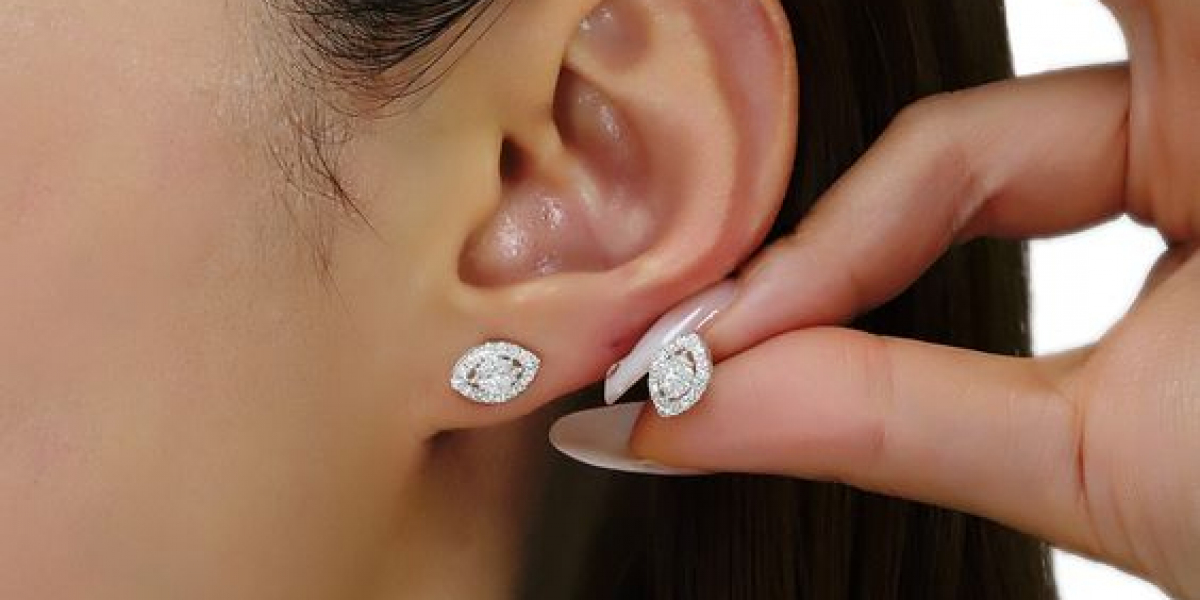Finding the ideal sets of studs can be a test, particularly on the off chance that you have delicate ears. Many people love the look of silver earrings, but not all silver is created equal—some can cause irritation, redness, or even allergic reactions. In this guide, we’ll explore how to choose the best silver earrings for sensitive ears, ensuring both comfort and style without compromising on beauty.
Why Some Earrings Cause Sensitivity
Ear sensitivity is often caused by certain metals, such as nickel, which is commonly found in many jewelry alloys. When these metals come into contact with the skin, they can cause allergic reactions, leading to irritation, itching, or swelling. The solution for sensitive ears is to choose earrings made from hypoallergenic metals—ones that are less likely to trigger such reactions.
But how does silver fit into this picture? While silver is generally considered safe, it’s important to understand the different types of silver used in jewelry, as not all of them are suitable for sensitive ears.
Understanding Silver Types for Sensitive Ears
Pure Silver (Fine Silver – 99.9% Silver)
- Pros: Pure silver, also known as fine silver, is one of the most hypoallergenic options available because it contains 99.9% silver and no other metals. This makes it an excellent choice for sensitive ears.
- Cons: However, pure silver is soft and prone to bending or damage, making it less durable for everyday wear. You’ll often find pure silver in higher-end jewelry pieces, but for earrings worn frequently, durability could be an issue.
Sterling Silver (92.5% Silver, 7.5% Other Metals)
- Pros: Sterling silver is the most popular type of silver used in jewelry. It’s made of 92.5% silver mixed with other metals, typically copper. This added copper increases the durability of the earrings without significantly affecting skin sensitivity.
- Cons: While sterling silver itself is usually safe, the 7.5% of other metals could potentially contain nickel in lower-quality products, which may cause allergic reactions. To avoid this, always check if the sterling silver earrings are nickel-free.
Silver Plated Jewelry
- Pros: Silver-plated earrings are made by coating a base metal (like brass or nickel) with a thin layer of silver. They’re affordable and look like sterling silver at a glance.
- Cons: The problem with silver plating is that the layer of silver can wear off over time, exposing the base metal underneath, which may cause irritation for sensitive ears. This option is not ideal for those with metal allergies.
What to Look for in Silver Earrings for Sensitive Ears
Nickel-Free Silver Nickel is one of the most common culprits behind allergic reactions in earrings. When shopping for silver earrings, make sure to look for products labeled "nickel-free" or "hypoallergenic." This ensures that the small percentage of other metals in the alloy won’t irritate your skin.
Coated or Rhodium-Plated Silver Another great option for sensitive ears is rhodium-plated silver earrings. Rhodium is a precious metal that is part of the platinum family and is often used to coat silver jewelry. This plating adds an extra layer of protection, preventing tarnish and creating a hypoallergenic barrier between the earring and your skin. Rhodium-plated earrings can also add durability and extra shine to your silver pieces.
Avoid Silver-Plated Earrings As mentioned earlier, silver-plated earrings may look attractive, but they are not ideal for sensitive ears due to the risk of the underlying metal becoming exposed. It’s better to invest in sterling silver or fine silver, which offer long-term comfort and safety for sensitive skin.
Look for Hypoallergenic Certifications Some manufacturers specifically design earrings for sensitive ears and may label them as “hypoallergenic.” These earrings undergo tests to ensure they don’t cause irritation. When in doubt, choose earrings from brands that specialize in hypoallergenic jewelry, and always read the product descriptions carefully.
Best Styles of Silver Earrings for Sensitive Ears
Stud Earrings Silver stud earrings are a timeless choice for those with sensitive ears. They’re small, elegant, and often come in hypoallergenic options like fine silver or rhodium-plated sterling silver. Studs are less likely to tug on your ears, reducing the chance of irritation, and are perfect for everyday wear.
Hoop Earrings Silver hoop earrings are another popular choice. For sensitive ears, opt for hoops made from sterling silver or those with rhodium plating. Make sure they are lightweight and not too large, as heavier hoops can cause discomfort over time.
Dangle Earrings If you prefer a more dramatic look, silver dangle earrings can be a beautiful option. Choose earrings that are labeled hypoallergenic, and avoid any with silver-plated or mixed-metal components to ensure they are comfortable for long-term wear.
Huggie Earrings Huggie earrings, which are small hoops that hug the earlobe, are great for sensitive ears because they provide a secure fit and are often made from sterling silver. Look for versions with a smooth finish and no sharp edges to prevent any discomfort.
How to Care for Silver Earrings for Sensitive Eyes
To prolong the life of your silver earrings and ensure they remain safe for your sensitive ears, it’s essential to care for them properly.
Regular Cleaning: Clean your silver earrings regularly with a soft, lint-free cloth to remove any buildup of dirt, oils, or products like lotions and hairsprays. You can also use a mild soap and water solution to gently clean them, but be sure to dry them thoroughly afterward.
Storage: Store your silver earrings in a cool, dry place when not in use. Use a soft jewelry pouch or a box lined with fabric to prevent them from scratching or tarnishing. Keeping your earrings in a tarnish-resistant bag can help maintain their shine.
Avoid Harsh Chemicals: Avoid exposing your silver earrings to chemicals found in perfumes, hairsprays, and cleaning agents, as these can cause tarnishing and may affect the coating, especially for rhodium-plated jewelry. Always put on your earrings after applying products to minimize contact with chemicals.
Conclusion
Choosing the perfect silver earrings for sensitive ears doesn’t have to be complicated. By selecting nickel-free, hypoallergenic options and avoiding silver-plated earrings, you can enjoy the beauty of silver without any discomfort. Whether you prefer simple studs, elegant hoops, or statement dangles, there’s a perfect pair of silver earrings out there for you that combines comfort and style. Remember, investing in high-quality silver earrings will not only keep your ears happy but also ensure that your earrings remain a staple in your jewelry collection for years to come.









